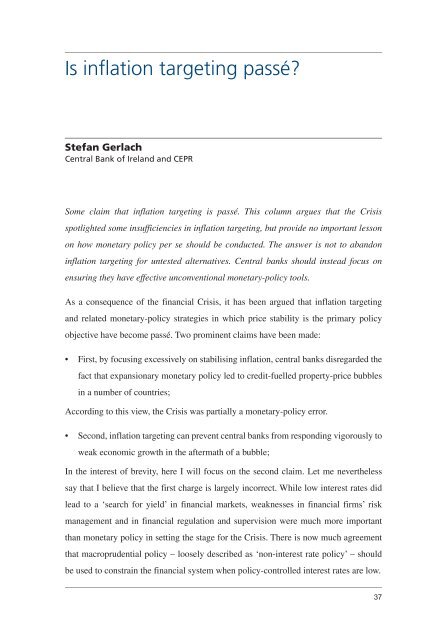Is inflation targeting dead? Central Banking After the Crisis - Vox
Is inflation targeting dead? Central Banking After the Crisis - Vox
Is inflation targeting dead? Central Banking After the Crisis - Vox
You also want an ePaper? Increase the reach of your titles
YUMPU automatically turns print PDFs into web optimized ePapers that Google loves.
<strong>Is</strong> <strong>inflation</strong> <strong>targeting</strong> passé?Stefan Gerlach<strong>Central</strong> Bank of Ireland and CEPRSome claim that <strong>inflation</strong> <strong>targeting</strong> is passé. This column argues that <strong>the</strong> <strong>Crisis</strong>spotlighted some insufficiencies in <strong>inflation</strong> <strong>targeting</strong>, but provide no important lessonon how monetary policy per se should be conducted. The answer is not to abandon<strong>inflation</strong> <strong>targeting</strong> for untested alternatives. <strong>Central</strong> banks should instead focus onensuring <strong>the</strong>y have effective unconventional monetary-policy tools.As a consequence of <strong>the</strong> financial <strong>Crisis</strong>, it has been argued that <strong>inflation</strong> <strong>targeting</strong>and related monetary-policy strategies in which price stability is <strong>the</strong> primary policyobjective have become passé. Two prominent claims have been made:• First, by focusing excessively on stabilising <strong>inflation</strong>, central banks disregarded <strong>the</strong>fact that expansionary monetary policy led to credit-fuelled property-price bubblesin a number of countries;According to this view, <strong>the</strong> <strong>Crisis</strong> was partially a monetary-policy error.• Second, <strong>inflation</strong> <strong>targeting</strong> can prevent central banks from responding vigorously toweak economic growth in <strong>the</strong> aftermath of a bubble;In <strong>the</strong> interest of brevity, here I will focus on <strong>the</strong> second claim. Let me never<strong>the</strong>lesssay that I believe that <strong>the</strong> first charge is largely incorrect. While low interest rates didlead to a ‘search for yield’ in financial markets, weaknesses in financial firms’ riskmanagement and in financial regulation and supervision were much more importantthan monetary policy in setting <strong>the</strong> stage for <strong>the</strong> <strong>Crisis</strong>. There is now much agreementthat macroprudential policy – loosely described as ‘non-interest rate policy’ – shouldbe used to constrain <strong>the</strong> financial system when policy-controlled interest rates are low.37














